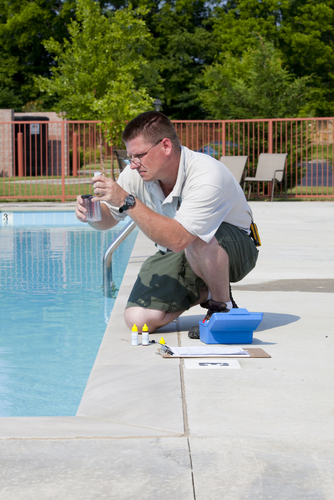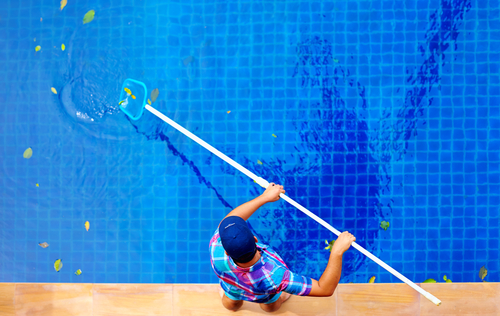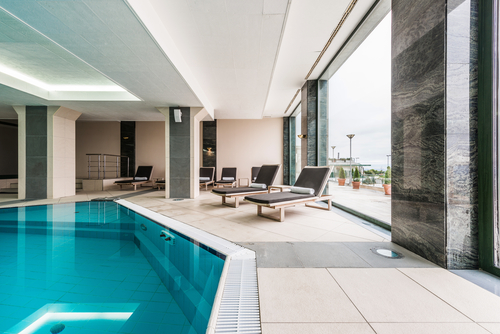Hotel pools have been a featured amenity for many years. Whether traveling with your family or for business, a relaxing swim or time in the hot tub is a great way to unwind at the end of the day. However, many hotel owners are questioning the value of the pool. It is hard to quantify. There is no clear dollar amount for using the pool, as it is included in the room fee.
If your pool is empty for a large percent of the day, you may question the value when you are paying for the upkeep and maintenance of the pool. This is complicated further if the pool is an indoor pool, where the pool “health” includes the HVAC system you are using.
When a hotel owner is balancing the cost of the pool vs. the revenue it brings to the hotel, it can be difficult to determine. Certainly, if all your local competitors offer a pool, you had better continue to offer the pool also.
Once the decision is made to offer a swimming pool and/or a hot tub for hotel guests to enjoy, the top priority for the owner is the safety of the swimmers. You have the responsibility to provide a properly sanitized pool and surrounding areas. So, how do you accomplish this? There are three areas that need specialized attention: the pool surround, the pool water, and the air quality in the pool area. These are 8 suggestions on how to manage all three.

Test the water. The pool water should be tested at least once a day and more than that if the pool is getting heavy use. It is much easier to fix a small problem in the balance of the pool chemicals than to be faced with a major algae bloom or other conditions that could result in having to close your pool while it is being treated.
Select a pool manager. Designate the person or service that is responsible for the health of the pool. Ideally, the person in charge of your pool should be a certified technician. If you have decided that the person will be an in-house employee, they should have training on how to test accurately, how to store the pool chemicals safely, and how to use them in the pool so they are effective and safe for swimmers.
Keep accurate records. Keep records of the test time and test results and who performed the test. If there is a large discrepancy between results, it may indicate that the person doing the test needs additional training. There are also computer programs that keep track of the results for you and which can identify trends early. This will also help to keep small problems from escalating into larger problems. These programs also prevent anyone from back-filling data so you will know if testing was completed as needed.
Sanitize the pool deck and shower and bathroom, frequently. Depending on how heavy the use of your hotel pool, you may need to do this as part of your daily routine pool care. Wet surfaces are a breeding ground for certain bacteria, and the swimmer with bare feet can be exposed to a variety of diseases just by walking on a contaminated surface.

Vacuum and skim the pool frequently. The frequency of vacuuming your pool will be dependent on how heavy the use is, as well as the environment. If the pool is outdoors, there may be times when there is more pollen in the air or plant debris such as flower blossoms, grass clippings, or leaves are more of a nuisance.
Check the filter. Your pool filter will be your first line of defense to keep the pool water pristine. There are pool filter cleaner products available to degrease your filter from the body oil, sunscreen oil, and soap scum. This will lengthen the life of your filter and help it to function at optimal efficiency.

Check the ventilation. If your hotel pool is indoors, its ventilation is of major importance. Have your HVAC technician check the area of the pool to assure the equipment is adequate to circulate and manage both the air quality and humidity. He can also check that there are no areas that hold stagnant air and prevent circulation from specific areas of the pool’s location. This can prevent asthma attacks and other respiratory conditions.
Enforce the use of disposable swim diapers. Institute a policy that requires infants and children who are not potty trained to wear disposable swim diapers. Have them available for purchase in your gift shop. Regular disposable diapers are not made for prolonged exposure to the water. The swim diaper can withstand being in the water but, more importantly, it has better elastic made to prevent fecal contamination of the pool.
The more you can do to prevent contamination, the easier it will be for you to maintain a beautiful and safe swimming experience for your hotel guests.
 Hello Guest,
Hello Guest,  0 item(s)
0 item(s)
